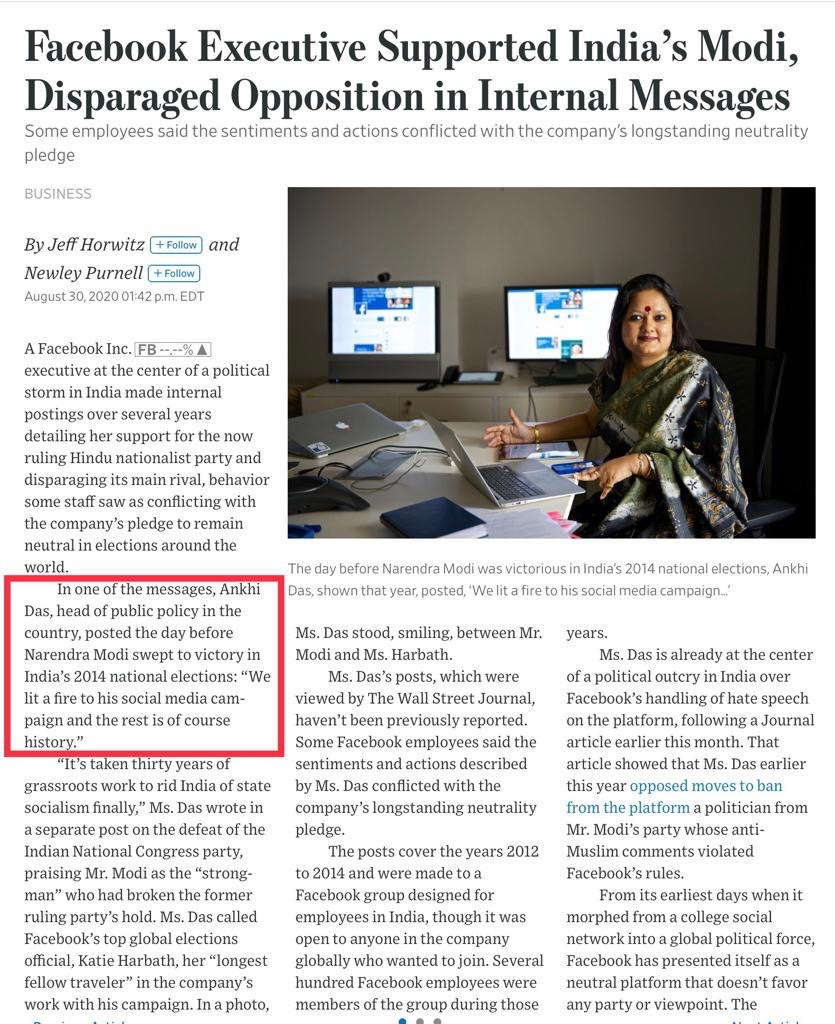
The revelations in the foreign media of Facebook’s pro-BJP bias in India have (so far) been confined to the oral interventions and internal notes of its chief lobbyist Ankhi Das, but the possibility of the social media giant having “tailored” or “altered” its algorithms to help the BJP is a matter for deeper journalistic and political scrutiny.
So says Kunal Purohit, an award-winning Mumbai-based journalist and researcher who has been examining the role of social media in the rise of Hindu nationalism and the spurt of Hindutva hate crimes.
“Facebook might have lent a better understanding [to the BJP] of how to beat or master the algorithm game,” says Purohit on J-POD, the journalism podcast.
“I am fairly certain BJP has been given a better understanding of how to maximise their presence and how to work their way around the algorithms. This is a matter of investigation for all journalists who are looking at this right now to see whether there was any ‘insider help’ to the BJP to try and tailor the alogrithms in favour of the BJP.
“If that has indeed happened, that is extremely serious and can be quite damaging to Facebook and its credibility.” (hear excerpt, above)
According to three reports in The Wall Street Journal (above) and Time magazine since August 15, Facebook’s public policy head Ankhi Das waved away hate speech by BJP supporters for “business prospects” and fearing a “political fallout”.
Following the revelations, Das has apologised to her Muslim colleagues; Facebook executives have appeared before a parliamentary committee on IT; and the BJP member has been “banned” from the platform for “hate speech”.
The BJP and Congress have also been involved in a war of words with Facebook founder and CEO Mark Zuckerberg.
But all this frenetic activity, says Kunal Purohit, only scratches the surface.
The real issues are: how deep are the ties between Facebook and BJP, and in effect the Narendra Modi government; the extent to which Facebook helped BJP in its social media campaign—and whether FB fiddled around with its algorithms to help BJP.
“Facebook has been open about the fact that it does assist its ‘partners’ in getting better in their presence on the platform. BJP would have certainly been helped in understanding the platform and to get better at it. I want to see the extent of what that assistance was and if that assistance was also provided to the Congress or the Aam Aadmi Party,” says Purohit.
“Some of BJP’s social media campaigns might put some of the best social media managers to shame, for the narrative they manage to stitch each and every time. Social media is where they turn the facts on the ground and create a parallel narrative which helps them immensely to beat back criticism. This is why Facebook is essential to the BJP and Modi.
“Not many of the mainstream media are willing to prick the BJP narrative actively, so social media allows BJP to set their own narrative in a bubble of sorts. Facebook allows BJP to exploit this bubble completely. It allows BJP to filter out the reality. It’s a clever way of ensuring that the news media does not set the agenda in the conversation between the party and its supporters. The party can in an unfiltered, unregulated, unchecked manner set the agenda very consistently and ensure its supporters remain in the bubble. It is this we need to unravel. How did Facebook allow BJP to gain such a presence?”
Listen to the full podcast with Kunal Purohit.
“Chimpanzees with nukes”
Facebook’s algorithms is the brain of its business model. It is a super-secretive operating system designed for “continuous, individualistic behaviour modification”, and not all of Facebook’s top executives have access to it.
Except Mark Zuckerberg (who interviewed Narendra Modi in 2015).
At least two top Facebook executives—former president Sean Parker and former vice-president of user growth Chamith Palihapitiya—have spoken about Facebook’s algorithms after leaving the Menlo Park-based company.
Chamith Palihapitiya (above): “We have created tools that are ripping apart the social fabric of how society works. It is eroding the core foundations of how people behave by and amongst themselves. You don’t realise how you are being programmed.”
Sean Parker: “Social media is exploiting a vulnerability in human psychology. It literally changes your relationship with society and with each other. God knows what it is doing to our children’s brains.”
For investigators from Parliament’s IT standing committee to journalists in media organisations, the question going forward is whether Facebook has brought all or some of the elements to its algorithms in India.
Former Google design ethicist Tristan Harris, who has deposed before US Congress on a similar issue, has said “it is happening not by accident but by design.” He calls Silicon Valley engineers designing these algorithms “chimpanzees with nukes”.
However in the 20 days since the first WSJ story appeared, almost no Indian media outlet has been over-eager to dig into such a goldmine, except for one story in The Economic Times and another in The Indian Express.
Kunal Purohit, who deposed before the Delhi Assembly committee investigating Facebook’s role in fanning the flames of the February 2020 riots in the capital, says this is not surprising given the wheels and deals Facebook has running in Delhi.
Purohit who had flagged the concerns in The Wire and Article 14 says on J-POD:
Profits, not ideology, drives Facebook
“Facebook officials might be inclined towards the BJP, but I don’t necessarily think Facebook is an ideologically driven platform which is trying to promote one ideology. It is a corporation which will only look at profit and will look at very little apart from its interests and its own profits.”
Capitalism at its best, or worst
“Facebook has realised that the way to do business here, to expand its reach, is to be closely aligned to the BJP, the ruling dispensation, favour it in whatever way it can, while safeguarding its own interests. This is extremely shrewd business, decision-making, backing people who are powerful claimants to the seat of power.”
Milking political power
“Facebook can cull out commercial benefits even if it is helping the aggressor as in US, Brazil, Myanmar or India. At the same time, Facebook has grown to be a behemoth, and Mark Zuckerberg is one of the most powerful individuals. It’s not a coincidence that the two things have happened simultaneously.”
Different strokes for different folks
“Officials like Ankhi Das and Shivnath Thukral are very clever choices by Facebook. They have chosen people who either have had previous experience of how to do deal with the BJP, or are ideologically linked with the BJP. If the Congress were in power, Facebook would do what it has to do in terms of cosying up.”
What’s BJP’s relationship with FB?
“There is a direct financial benefit. BJP is the biggest spender on advertisements on Facebook. That apart, among the top 10 ad spenders, there are three other pages affiliated to the BJP. Together, these four make up 50-60% of Facebook’s ad revenue from the top 10 advertisers. When you are in such a cosy relationship are you going to be fair? Can we expect you to be fair? The answer is no.”
What does Facebook get in return?
“Facebook is in tie-ups with the National Commission for Women, to the Ministry of Home Affairs. to the Ministry of Tribal Affairs to the CBSE. It may not get monetary benefits from these partnerships, and maybe the government is not paying it for its services, but Facebook is getting access to the market.”
What’s the unsolved mystery?
“Facebook owns WhatsApp which has been directly linked to lynchings, hate crimes, riots. Despite that, Facebook has been allowed to get away for so long. What is this compact bind that is holding Facebook and BJP together? Journalistically this is a pandora’s box that should be opened. There are many skeletons in the closet.”
Why media is silent
“The media, given the state it is in, doesn’t want to prod into issues which might be an embarrassment to the BJP or its members. Facebook has created partnerships with various media organisations. It has sponsored media events across newsrooms. It’s the classic advertiser-newsroom conundrum.”
Will Facebook get away?
“World over, governments and parliaments are wanting to hold Facebook to account. In India, the ruling government doesn’t seem very interested. BJP MP Nishikant Dubey tried to stall Facebook executives from being summoned before IT standing committee. IT minister Ravi Shankar Prasad has written to Mark Zuckerberg accusing some FB employees of bias.”
Will Ankhi Das survive?
“Is Ankhi Das so valuable to Facebook that it can take the damage, and the doubts over its credibility and integrity, and still retain her? What Facebook will do with her will tell us is how high the bar for propriety and how high the bar for integrity it has set for its own personnel.”
Where does the buck stop?
“The buck should not end at Ankhi Das. Had she been in Mark Zuckerberg’s chair, I would say the buck ends with her. If she is one cog in the wheel of Facebook, then we would be missing the point by only looking at her. It is critical to look at the role of these social media platforms in normalising hate and profiting from it.”
Also read: Facebook, BJP and Narendra Modi: How Ankhi Das fuelled hate speech fearing a “political fallout”
Everything you wanted to know about the Facebook scandal in 32 tweets and 8 links
Show some love for The Net Paper, the world’s first social media newspaper.
Spread the word.








